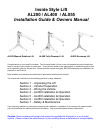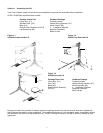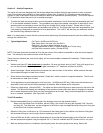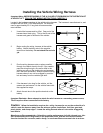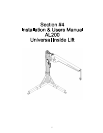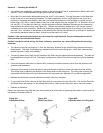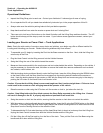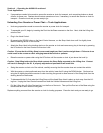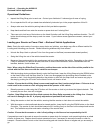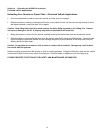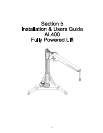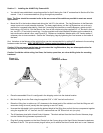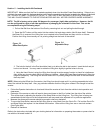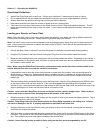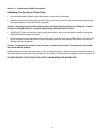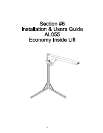
3
Section 2 - Vehicle Preparation
The Inside Lift has been designed with the shortest height and smallest footprint requirements to allow maximum
room for the loading and unloading of your scooter or power chair. If there is 30” of headroom and room for the
scooter or chair in the vehicle, then our lift should be able to be installed and operate properly. (The AL055 requires
37” of headroom unless the post is cut for smaller openings)
• To obtain the ideal mounting location and avoid possible interference, the lift should be pre-assembled and “trial
fit” in the desired installation location. This procedure may require two people, one person to hold the lift in the
desired position and another to move the Lifting Arm through its full range of motion. Please refer to Figure
#1.1—1.3 for the parts identification and exploded view of the lift. The Inside Lifts have been engineered so that
it can easily be configured as a solution for most applications. This “trial fit” will also help you determine where
the Vehicle Wiring Harness will be run.
Hint: It is always best to check with the customer when determining lift placement and ask permission before drilling
through the vehicle’s floor.
• Typical Applications Car Trunk—AL200 and AL055 only
Rear Cargo Area—for most vans and SUV’s.
Side Door—for use on either side door of a van.
Tailgate applications for SUV’s, Station Wagons and Trucks using
the offset arm conversion option. (Except AL055)
NOTE: The base should be mounted as far to the rear corner of the vehicle as possible in most rear mount applica-
tions. This allows for the maximum reach of the lifting arm.
There are some vehicles that, due to their setup, will not accommodate a standard lift installation. Please check for
the following:
• Vehicle must have 30” clear headroom
for operation. Be sure and check during “trial fit” that a full range of mo-
tion can be achieved without any roof or lift gate interference. (37” headroom required for AL055)
• Spare tire storage—Some vehicles store the spare tire under the floor of the vehicle. Make sure that the base
can be bolted through to a steel floor or frame.
• Some vehicles have been manufactured with a “false floor” which is made of composite materials. The lift must
be anchored to a steel floor or frame.
• Trunk applications must be secured to a flat trunk floor. (AL200 and AL055 only) Make sure that there are not
deep wells in the trunk that will affect placement of the base. Most of these can be overcome.
• Offset Arm Applications (Except AL055) - The offset arm allows the lifting arm to reach around to the side of the
vehicle. This allows the loading and unloading of the scooter or power chair when there is a tailgate to contend
with or when the base location does not allow a straight post to be used. Many times this application is referred
to as a “curbside” installation. (See Figure #4.2 or #5.3)
Trial Fit Procedure:
• Place the assembled lift as it is configured in the shipping carton into the desired location.
When using the Offset Post Conversion, bolt the Lifting Arm to the Post using the supplied 3-3/4” Hex bolt
and lock nut. The offset arm can be configured to left side or right side applications by bolting the Lifting Arm
to the Offset Post in either orientation.
• Raise the Lifting Arm to achieve to an 1/8” clearance to the lowest point of the vehicle’s roof that the Lifting Arm
will encounter during its travel (usually the door opening or rear A/C vents).
• On the AL200 and AL400, unscrew the Adjustable Link to provide the desired height of the Lifting Arm and bolt
the two components together using the supplied 3/8” x 2” hex bolt, washers and 3/8” Stover lock nut—no nylon.
• Mark the desired position for installation including the power wire and proceed to the wiring Section #3.



